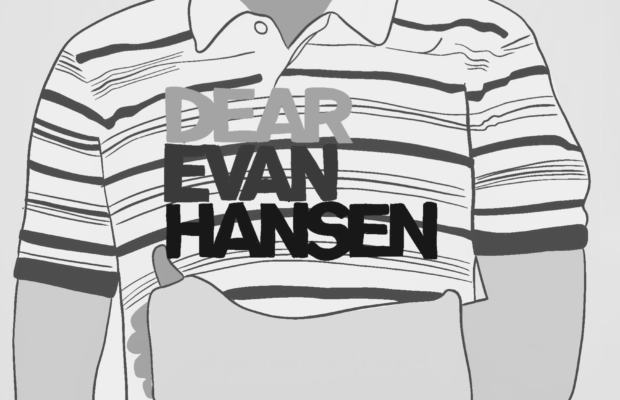Dear Evan Hansen sings from the stage to the cinema

“Dear Evan Hansen’’ carries a message that high schoolers as well as adults can relate to, even if it is awkward at times.
The story of the musical is set in a 17 year old’s senior year of high school, with the accompaniment of social anxiety and depression. On his first day of school, Evan is faced with an assignment from his therapist where he writes a letter to himself starting with “Dear Evan Hansen,” in an effort to convince himself that the day would be a good day.
An unsuspecting Connor Murphy takes the letter from the library printer and gets upset after finding that his sister’s name is mentioned as Evan’s crush. He then storms out of the library, leaving Evan frightened. Little does he know that later that day Connor takes his own life following his difficult battle with drugs and depression. When Evan returns to school three days later he is called to the principal’s office and finds Connor’s parents with the same letter Evan wrote to himself, with the parents explaining that the letter was the only thing that Connor had with him during his passing. This process all unfolds through a series of heartfelt songs in the span of twenty minutes per musical fashion of course.
Evan then falls into a series of lies and betrayal in order to keep up the relationship he develops with Connor’s sister and family. The biggest lie being that he and Connor were best friends before his passing. With the falsehood surrounding Evan’s relationship with Connor, he meets another girl wanting to create a memorial service for Connor who struggles with anxiety as well. Although their friendship is based on a mistruth, Evan learns that he and Connor aren’t the only ones who struggled and are still struggling with mental health issues. One song in particular titled “The Anonymous Ones”, performed by Amandla Stenberg, reveals the true weight of how someone who struggles with mental health that tends to hide their feelings with a smile, can be struggling just as much as someone who doesn’t hide what they are going through.
Along with the struggles of anxiety and depression, the movie also captures the different stages of grief the Murphy family endures while dealing with the death of Connor. The mother, for example, grieves through denial regarding her son’s last days while Connor’s sister, Zoe, grieves through remembering the bad parts of her brother’s personality in order to avoid truly feeling anguish. While struggling with the pressure of the family’s desire to get answers about Connor, Evan decides to lie in order to bring relief to the grieving family. With Evan’s lies, however intentionally positive, helping the Murphy family grieve and move on only made realizing that they were untrue that much harder.
Following the anticipation for the truth to become known, the ending depicts Evan coming to terms with what he had done while the truth begins to unfold, along with him finding ways of connecting with Connor by talking to people that truly knew him. With the ending theme of revealing the truth, Evan also begins to reveal his mental issues with his mother in a tearful segment called “So big/So small” that brings light to his mother’s related struggles as well as his own. Although this movie is a musical which might not appeal to some, it beautifully reflects the complexity of the minds of teenagers as well as adults in the struggles with mental health. Sometimes people may feel that they are alone with what is going on in their own head but the more that we shed light and talk about what we are going through, the more we can help and support each other.



